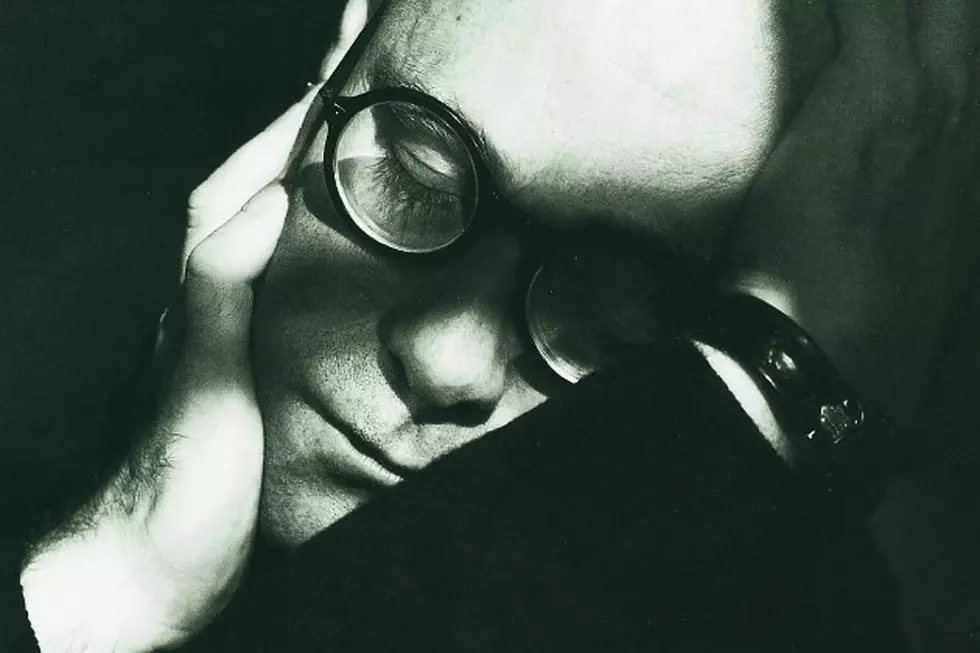
How Elton John’s ‘Sleeping With the Past’ Arrived Amid Turmoil
With 1988's Reg Strikes Back LP, Elton John rebounded from a commercial lull that included a pair of the poorest-selling releases of his career (1985's Ice on Fire and 1986's Leather Jackets). After weathering a number of ups and downs during the previous decade, he looked like he was finally regaining some of the consistency that helped make him one of the biggest stars of the '70s.
Behind the scenes, however, John's life was beset with turmoil on several fronts. Before recording Reg Strikes Back, he'd weathered a health scare that ended with the surgical removal of several non-cancerous polyps from his vocal cords. He also spent several years embroiled in a public legal battle against the U.K. tabloid the Sun, suing the paper for libel after they published a series of ugly (and increasingly bizarre) falsehoods.
The Reg hits "I Don't Wanna Go On with You Like That" and "A Word in Spanish" were two of his stronger singles of the '80s, but he privately continued to battle substance abuse issues that would shortly send John to rehab.
In the midst of all these creative triumphs and personal struggles, he and his longtime creative partner, Bernie Taupin, reconvened in late 1988 to write and record what would become his 22nd studio LP, Sleeping With the Past. Released Aug. 29, 1989, the record found the duo trying to do something they really hadn't done in awhile: assemble a collection of songs that truly held together as an album-length listening experience.
In the weeks after its release, John called Sleeping With the Past "the strongest record we've ever made," which is pretty much the same thing every artist says after finishing a new project. But in this case, John later explained, "We went back to our roots and tried to do something special. Bernie and I came up with the idea of making an album that paid tribute to all the great old soul songs we'd grown up with, and I feel that also gives it a real sense of continuity."
Listen to Elton John's 'Sacrifice'
Taupin agreed in an interview with Music Connection, "I said to Elton, "Listen, we can't make another album where people are going to say, 'it's just another Elton John album.' I mean, we're up to like 30 albums now, and I said that we had to sit down and decide what we wanted to make, and make a cohesive album with a collection of songs that sound like they all fit together."
As per the album's title, the partners decided to move forward by looking back. "We came up with the idea of going back and listening to the songs that inspired us when we started writing songs – the time when R&B records were really great," Taupin continued. "The Chess days, the Stax records, and when Motown was at its peak. ... I started dragging out all these old records and listening to them to get a feel, and we decided to basically make a white-soul album for the late '80s, and I think that's what we've done."
Of course, Sleeping With the Past was far from the first album to pay tribute to a bygone musical era. In fact, just a few years earlier, Billy Joel had scored one of the biggest hits of his career with An Innocent Man, an LP-length pastiche of pre-Beatles rock. But where Taupin saw that as a "direct emulation," he pointed out that he and Elton took a less obvious approach with their homage.
"This is a songwriting salute. It's all inspired and it says that on the album, and due to that it's really given the album a cohesiveness. It's not a concept album, but there's a concept in the ideas," he said. "More than any other record we've made, this sounds like an album. It sounds like it all belongs together, and I'm really, really proud of that. We worked really hard on this record, and we worked hand-in-hand on this one."
"I know that people get trapped in nostalgia and will argue that the old songs are our best, but I think as songwriters we're far better than we've ever been and I think this new album proves that," Taupin argued.
"I think we've been in the wasteland for a little while. A lot of our recent albums have been fairly inconsistent. I wasn't particularly happy with the last album, although it had its moments. I just feel that over the last few years, our albums haven't really had a cohesiveness; they've tended to confuse people because the musical styles and song structures have been so conflicting that they go up and down, up and down. I know that's a salute to our diversity, but I also think it confuses people."
Watch Elton John's Video for 'The Club at the End of the Street'
Somewhat surprisingly, given how closely it followed the success of Reg Strikes Back, Sleeping With the Past got off to a bit of a slow start on both sides of the Atlantic. The first single, "Healing Hands," went to radio around the album's release, but didn't peak until late in the fall, hitting No. 1 on Billboard's Adult Contemporary chart toward the end of October.
The follow-up, "Sacrifice," was eventually a huge hit in the U.S. as well as the U.K., but it also took its time finding an audience. In fact, the song failed to catch on at all in England at first. It wasn't until the label reissued it in the spring of 1990 that it took off, eventually becoming, surprisingly, John's first British No. 1 single as a solo artist. He had previously only topped the chart in his native land with "Don't Go Breaking My Heart," his duet with Kiki Dee.
With a third hit single, "The Club at the End of the Street," following in the summer of 1990, Sleeping With the Past cemented its status as one of the more radio-friendly records of John's post-'70s peak, and although it stalled out at a relatively disappointing No. 23 on Billboard's album sales chart, it eventually went platinum, helping John and Taupin close the turbulent '80s on a decisively high note – both as co-writers and as friends.
In fact, as Elton later explained in David Buckley's Elton: The Biography, the Sleeping With the Past sessions strengthened their personal bond. "We spent a lot of time together – not writing, but we spent a lot of time together. And I realized how valuable our relationship was and how much I really admired and respected him, and how much I really needed him as a part of my life."
Watch Elton John's 'Healing Hands' Video
Friendship would be a recurring theme for John during this period, both with Taupin (to whom Sleeping With the Past is dedicated) and with Ryan White, the Indiana teen whose AIDS diagnosis made headlines and raised awareness of the disease and its causes during a time when HIV ignorance was widespread.
White's death in April 1990 helped spur John to seek help for his long-standing substance abuse problems, and he entered rehab later in the year – an experience he'd write about in his book Love Is the Cure: On Life, Loss, and the End of AIDS.
John would emerge from that experience a changed man, and though the '90s were ultimately an even more successful decade for him – owing partly to the blockbuster success of his work on the Lion King soundtrack – he no longer pursued or expected hit records the way he once had. As the years wore on, he'd increasingly make music on his own terms, with little-to-no-thought of pop stardom.
"By this time, I had known for years that my little run was up. I studied the charts, I'm a fan, and I know that people have their little time in the sun when they can do no wrong. It maybe lasts for five albums, six albums, and then someone else comes in," he later pointed out. "It was the last album before rehab, but it was a good album."
Elton John Albums Ranked
More From Ultimate Classic Rock









